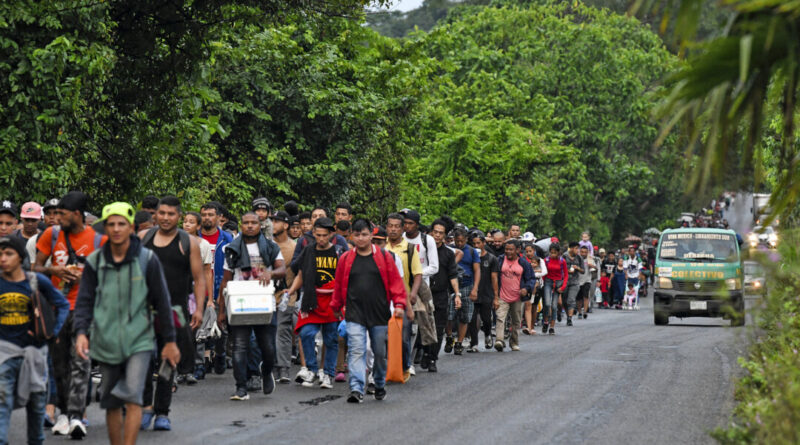Conrad Black Argues Against Painting Canada and Mexico with the Same Brush on Illegal Immigration and Trade Issues
Commentary
Raising tariffs is a nonsensical response to complaints about border control with a neighbouring country. In the case of the United States, the recent announcement by President-elect Donald Trump that he will raise tariffs 25 percent on Mexico and Canada unreasonably equates the conduct of both those countries towards the United States.
For many years, Mexico has made a practice of luring American manufacturers into Mexico, promising them a tax holiday on their income and assistance in factory construction as well as the advantages of cheap Mexican labor to facilitate the exportation back into the United States of the goods the companies formerly produced there. They also stamp a great many fabricated parts from China as “made in Mexico” and slip them duty-free into the United States. This created unemployment in the United States and reduced U.S. government income by the removal of these activities, even though the income of the manufacturers increased in Mexico. This is a commercial policy of successive Mexican governments that justifies some American retaliation on tariffs. Obviously, no Canadian government, federal or otherwise, has engaged in any such activity.
On the border control question, it hardly needs to be belabored here that what has occurred on the U.S.–Mexican border is an outrage and an invasion. In general, it is the responsibility of the country whose borders are being violated to reinforce those borders and prevent their violation. Totalitarian dictatorships have been known to build border walls and impenetrable fences to keep their populations enclosed under their jurisdiction, but Canada is a thoroughly democratic state and does not prevent any law-abiding person from leaving the country.
The American complaint with Canada is stated as 19,000 illegal entrants from Canada to the United States in 13 months, a sharply increased rate. But 19,000 people between two countries with a total of 370 million people on a border of 5,000 kilometers is nothing to get so excited about as to threaten the strangulation of the commercial relationship between two of the world’s greatest trading powers. Some allowance must be made here for the fact that Donald Trump often handles foreign policy as a poker game. That is likely, to some extent, what he’s doing here, particularly since he will not be inducted into the great office of president of the United States for another seven weeks.
It is generally agreed that next to inflation, the greatest cause for the American public’s rejection of the Biden–Harris administration in favor of Trump’s return was Biden throwing open the southern border to allow 10 million or more mainly destitute and desperate people from all over the world to enter. Included among them are many violent criminals—more than 30,000 murderers and rapists have already been identified and convicted—and traffickers bringing in hugely dangerous quantities of…
Mexico is primarily serving as a conduit through which people from all over the world make their way to the United States. The fact that the outgoing Biden–Harris administration facilitated this is not something that should affect Canadian–American relations. Sovereign states protect their own borders, and the President-elect has already declared his intention to extend the wall that he previously started to the extent that he had planned, increase the strength of forces protecting the southern border, and ensure the necessary court facilities to deal with the volume of people claiming asylum.
Trump’s proposed increase in tariffs with Mexico is presumably chiefly a response to alleged Mexican violations of its trade arrangements with the United States, and in any case has nothing to do with Canada. To the best of our knowledge, the incoming president has no grievance with Canada’s actions as a trading partner, but has advised this writer that he thinks our “trade negotiators are better than the Americans.” If that is true, the answer is to get better trade negotiators.
It may be that the United States has legitimate grievances—that Canada has given refuge to some international terrorists and that some of them have passed into the United States. A number of terrorists and terrorist suspects seem to have made their way to the United States via Canada, and there could not possibly be any contentious differences between the U.S. and Canadian governments in respect of these cases: they should not have occurred and we must take every possible reasonable precaution to prevent any recurrences. But as far as can be established, these people did not originate in Canada and only used Canada as a stepping-stone to America. The ultimate responsibility for admission and refusal of admission to a country lies with the country being entered.
Presumably, Trump is trying to encourage Canada to do a better job of keeping terrorists out of North America and specifically out of the United States, and of course we must do that. If, which seems to me unlikely, Trump clings to this blunt-force method of registering his complaint about unrelated conduct by Canada, we should prepare to impose even higher tariffs on American goods entering this country, as well as to moderate the comparative value of our currency to cushion the blow of the U.S. tariffs and undertake a number of other reprisal measures.
The first would be to impose a cost of at least $100 per head on anyone departing Canada for the United States for nonessential purposes, i.e., vacation or leisure. At the same time, we could make arrangements with a number of Caribbean countries to buy resort facilities there and offer incentivized packages of low travel costs and low accommodation costs to Canadians visiting there. This would be a severe blow to Florida and other southern states. It would then also be time to contemplate joint-venturing the development of strategic minerals and other resources in Canada with countries other than the United States.
If these responses are aired and bring no flexibility from the incoming U.S. administration—and this would be completely astonishing—it would be time to remind the world that if this is how the United States treats its closest and least offensive neighbor, the implications for the U.S. alliance system are quite profound.
If these or similar methods did not produce a sharp de-escalation of the stated American position, it would be an incredible and sinister turn of events. However, it is so improbable it doesn’t deserve further consideration.
Views expressed in this article are opinions of the author and do not necessarily reflect the views of The Epoch Times.



